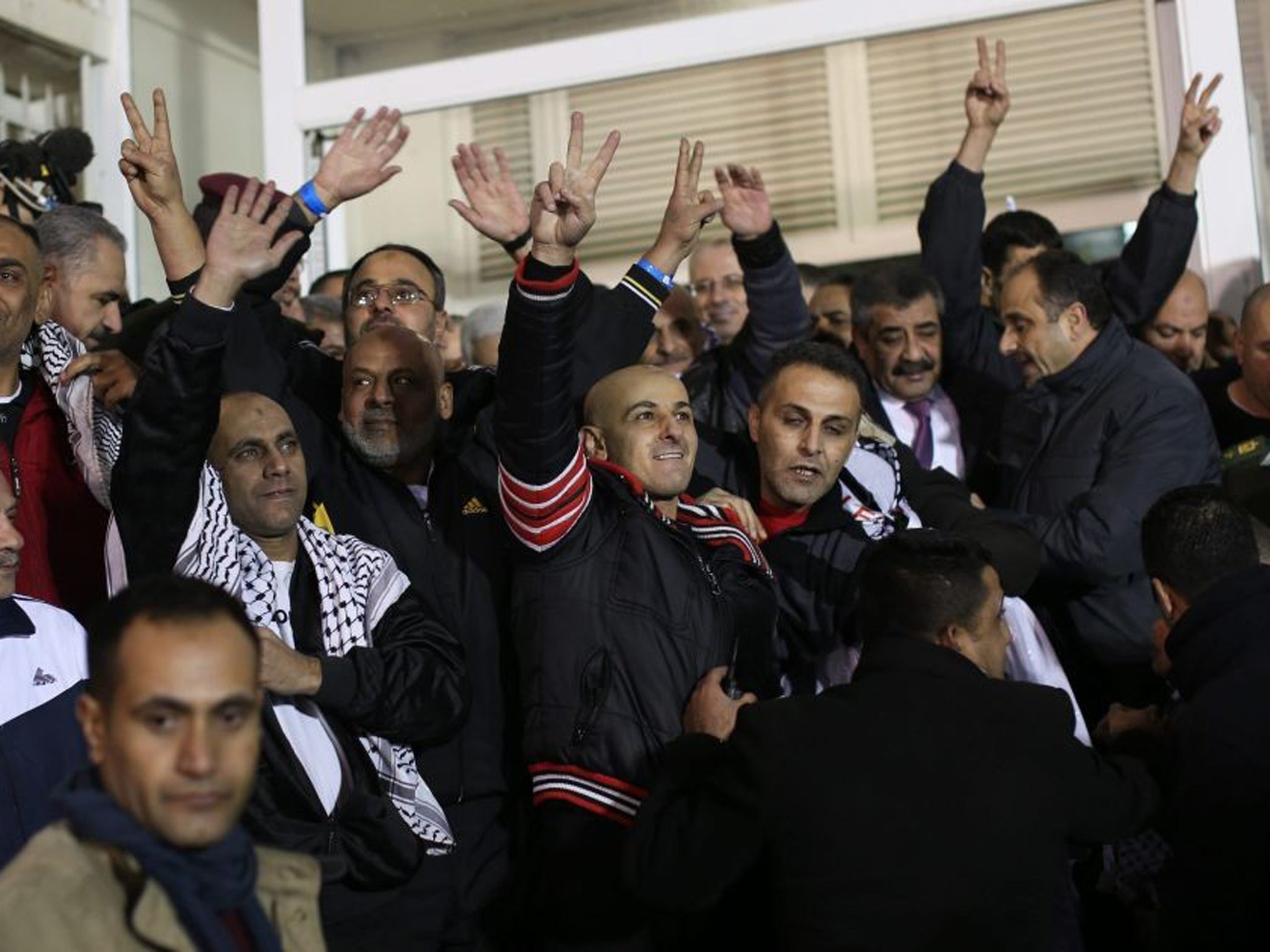Netanyahu faces backlash after Israel releases 26 Palestinian prisoners
Prisoners receive heroes' welcomes on their return to the West Bank and Gaza with officials and jubilant relatives lining up to greet them

Israel has released 26 Palestinians from its jails as part of a US-brokered deal to restart Middle East peace talks.
Alongside the release, a few days ago the country’s Prime Minister Benjamin Netanyahu announced the building thousands of new Israeli homes in settlements in the West Bank, which is internationally considered to be occupied Palestinian territory. The settlements themselves are considered illegal under international law.
Mr Netanyahu has received criticism from across the Israeli political spectrum, and wide public fury for the move. All of the men have been convicted of deadly attacks and have spent between 19 and 28 years in prison.
A group representing the families of those killed in the attacks appealed to the supreme court to block the release, but it was rejected last night.
Hardline allies of Mr Netanyahu meanwhile criticised him for linking the Jewish settlement cause with the release of prisoners convicted over killings of mostly Israelis, with one settler leader branding the move an “unnecessary stain on the construction”.
The Palestinians say they had received vague assurances that Israel would show restraint on construction while the talks continue. There is an April target date for a broad agreement and US Secretary of State, John Kerry will visit the region later this week. Saeb Erekat, the Palestinian chief negotiator, said last week that the building of new settlement homes would “destroy the peace process”.
After departing on buses from Israeli jails overnight, the prisoners received heroes' welcomes on their return to the West Bank and Gaza with officials and jubilant relatives lining up to greet them.
The prisoners included 18 men from the West Bank, three Gazans, and five men from East Jerusalem.
East Jerusalem, annexed by Israel in 1967, is considered a future capital by the Palestinians. Many Israelis regarded the whole of the city as their capital, although most other countries maintain embassies and diplomatic mission to Israel in Tel Aviv and do not recognise the divide city as a capital to either side.
The vast majority of Palestinians in East Jerusalem hold Israeli ID cards, but are not Israeli citizens.
At his headquarters in Ramallah, Palestinian Authority President Mahmoud Abbas waited to meet the some of the released prisoners in the middle of the night. Speaking before thousands, he pledged to continue pressing for the release of all long-serving and ill prisoners.
“We will not sign a final peace deal with Israel before all the prisoners are released,” he said.
The latest prisoner release is the third of four planned stages under a formula drawn up by US secretary of state John Kerry. In total, Israel agreed last summer to free 104 long-serving prisoners.
The releases generated excitement throughout Palestinian society, where prisoners are revered as heroes and freedom fighters. Families decorated their homes and neighbourhoods with posters of their loved ones who were returning home and planned large feasts. With most convicted of murder, Israel regards the prisoners as terrorists.
Amir Peretz, a cabinet minister with the dovish Israeli Movement party, said having the prisoners walk free could have been avoided had Mr Netanyahu agreed to freeze settlement building.
“I would have preferred to freeze settlement building rather than releasing (Palestinian) prisoners but at this point we must allow this stage to move forward, we must not do anything to prevent it,” he said.
Israeli commentators have also questioned Mr Netanyahu's judgment in pushing forward with more settlements.
“If Netanyahu has already undertaken to make this goodwill gesture, it would be best if he were to enjoy the international dividend that comes with it and not ruin things with a populist announcement about new construction,” said Shimon Shiffer, a columnist with the Yediot Ahronot daily paper.
“Netanyahu is like a cow that gives a bucketful of milk, only to kick the bucket over.”
Additional reporting by AP
Video: John Kerry to resume Israel-Palestine talks
Join our commenting forum
Join thought-provoking conversations, follow other Independent readers and see their replies
Comments